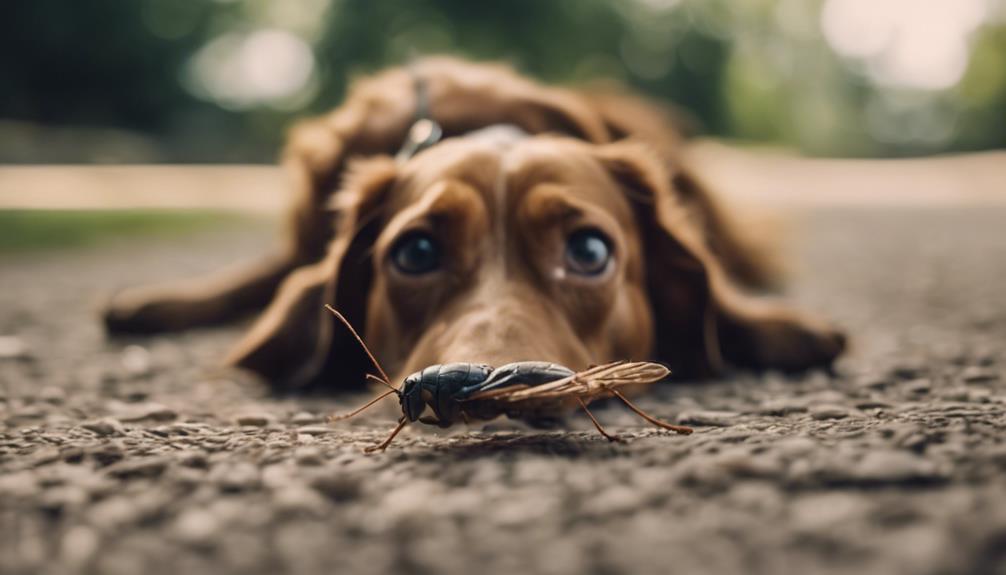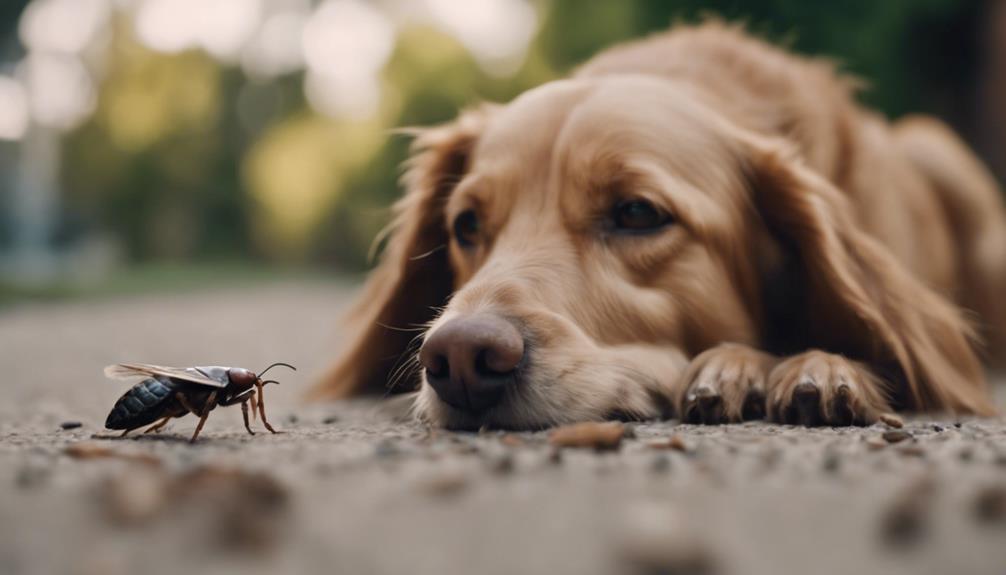As dog owners navigate the complexities of their pets' dietary habits, the question of whether dogs can safely consume cicadas emerges as a pertinent concern.
While the prospect of dogs munching on these buzzing insects may initially seem innocuous, a closer examination reveals potential risks that extend beyond mere curiosity.
By exploring the implications of dogs feasting on cicadas, a more nuanced understanding of this interaction can be gained, shedding light on crucial considerations that every pet owner should be aware of.
Key Takeaways
- Cicadas are safe for dogs to eat in moderation.
- Excessive cicada consumption can cause stomach issues.
- Symptoms like vomiting or diarrhea require veterinary attention.
- Cicadas do not pose significant health risks to dogs.
Cicada Behavior and Characteristics
The behavior and characteristics of cicadas, such as their annual emergence in July or August in North America, provide insight into their unique lifecycle and presence in the environment.
Cicadas, like the periodic Brood X, emerge every 13 or 17 years in U.S. states, showcasing distinct features such as black bodies, clear wings, red eyes, and large wingspans.
Male cicadas create deafening mating calls, reaching up to 100 decibels, comparable to a lawnmower. Their calls result from vibrating ribbed membranes, not vocal cords.
Identifying the sound of cicadas can be challenging, but listening to them in nature aids recognition.
After mating for 4-6 weeks, Brood X cicadas perish, leaving billions of exoskeletons behind, marking the continuation of their lifecycle.
Can Dogs Eat Cicadas Safely?
Considering the potential impact on canine health, the consumption of cicadas by dogs warrants careful evaluation. Cicadas themselves are not harmful to dogs and can be consumed in moderation without significant issues.
However, excessive ingestion of cicadas may result in gastrointestinal problems for dogs, such as vomiting, diarrhea, or lethargy. If these symptoms occur, it is advisable to seek veterinary attention promptly.
While cicadas do not pose a direct threat to dogs, monitoring their intake and ensuring it remains at a moderate level is essential to prevent any adverse reactions.
Risks of Dogs Eating Cicadas

When evaluating the risks associated with dogs consuming cicadas, it is crucial to consider the potential impact on canine health.
- Choking hazard: Cicadas have hard exoskeletons that can pose a choking risk if not chewed properly.
- Digestive issues: The tough exoskeleton and wings of cicadas can be difficult for dogs to digest, potentially leading to gastrointestinal upset.
- Allergic reactions: Some dogs may be allergic to insects like cicadas, causing symptoms such as itching, swelling, or respiratory distress.
Understanding these risks can help dog owners make informed decisions regarding their pets' exposure to cicadas. If any concerning symptoms develop after ingestion, prompt veterinary attention is essential to ensure the well-being of the dog.
Symptoms of Cicada Ingestion in Dogs
After evaluating the risks associated with dogs consuming cicadas, it is essential to recognize the potential symptoms of cicada ingestion in dogs for prompt identification and appropriate action.
Symptoms of cicada ingestion in dogs may include vomiting, diarrhea, lethargy, abdominal discomfort, drooling, or inappetence. These signs can indicate that the dog's digestive system is reacting to the ingestion of cicadas, which may lead to gastrointestinal upset.
It is crucial to monitor the dog closely for any unusual behavior or physical symptoms after consuming cicadas. If any of these symptoms persist or worsen, seeking veterinary care is recommended to address any potential issues and provide necessary treatment for the dog's well-being.
Managing Dog's Consumption of Cicadas

To ensure the well-being of dogs, it is important for pet owners to monitor and regulate their consumption of cicadas.
- Supervise Outdoor Time: Keep an eye on your dog when they are outside to prevent excessive snacking on cicadas.
- Training and Distractions: Implement training techniques to discourage your dog from eating cicadas and provide alternative distractions.
- Consult a Veterinarian: If you suspect your dog has consumed a large number of cicadas or is showing symptoms of distress, seek advice from a veterinarian promptly.
Other Considerations for Dog Owners
Dog owners should be mindful of additional factors that can impact their pet's well-being beyond just managing their consumption of cicadas. It's crucial to consider your dog's overall health and any pre-existing conditions before allowing them to eat cicadas. Some dogs may have allergies or sensitivities to insects, including cicadas, which could lead to adverse reactions.
Additionally, if your dog has a history of gastrointestinal issues, it's essential to monitor their intake of cicadas closely to prevent any digestive upsets. Always keep an eye on your dog when they are outdoors to ensure they are not overindulging in cicadas, as excessive consumption can still pose a risk despite being generally safe in moderation.
If you notice any concerning symptoms after your dog has eaten cicadas, such as vomiting, diarrhea, or unusual lethargy, promptly consult your veterinarian for guidance.
Conclusion
In conclusion, the interaction between dogs and cicadas raises important considerations for pet owners.
While cicadas themselves are not toxic to dogs, risks associated with ingestion include potential gastrointestinal issues.
Monitoring dogs closely during cicada emergences and seeking veterinary care if symptoms of ingestion arise are crucial steps in ensuring their well-being.
By understanding the implications of dogs consuming cicadas, pet owners can take proactive measures to protect their canine companions.




